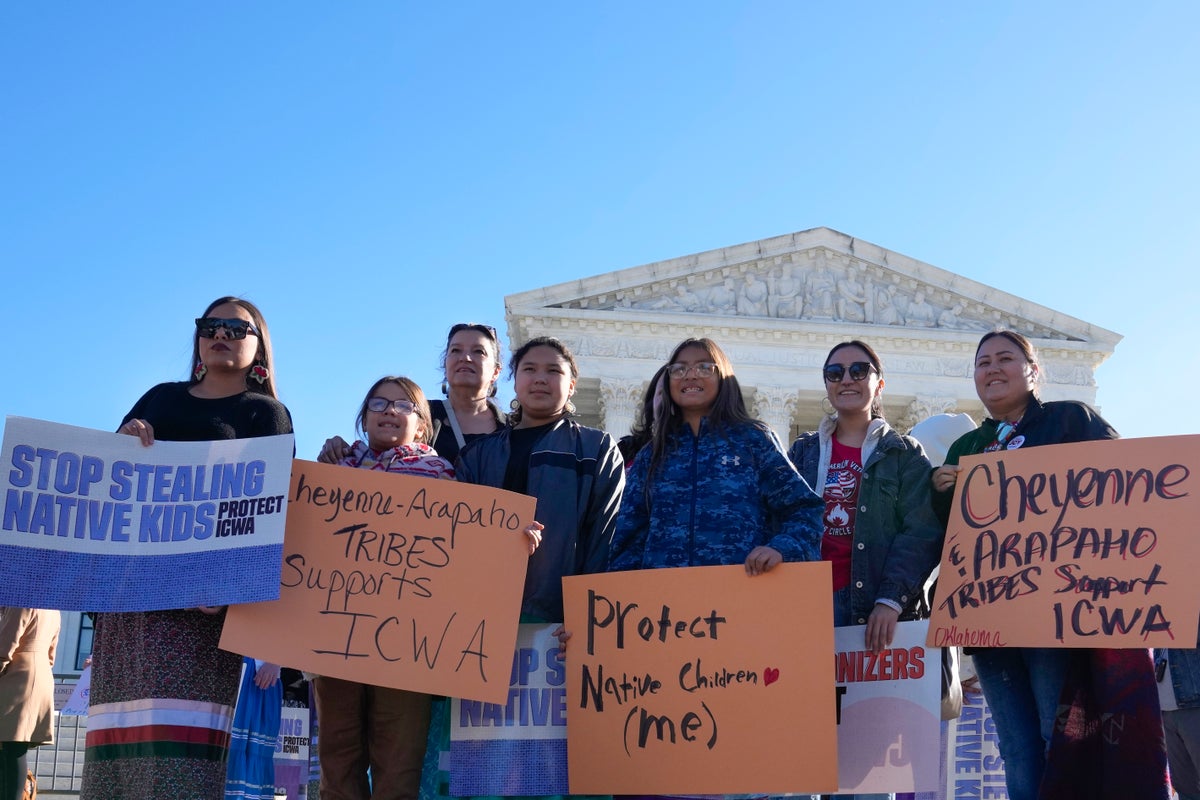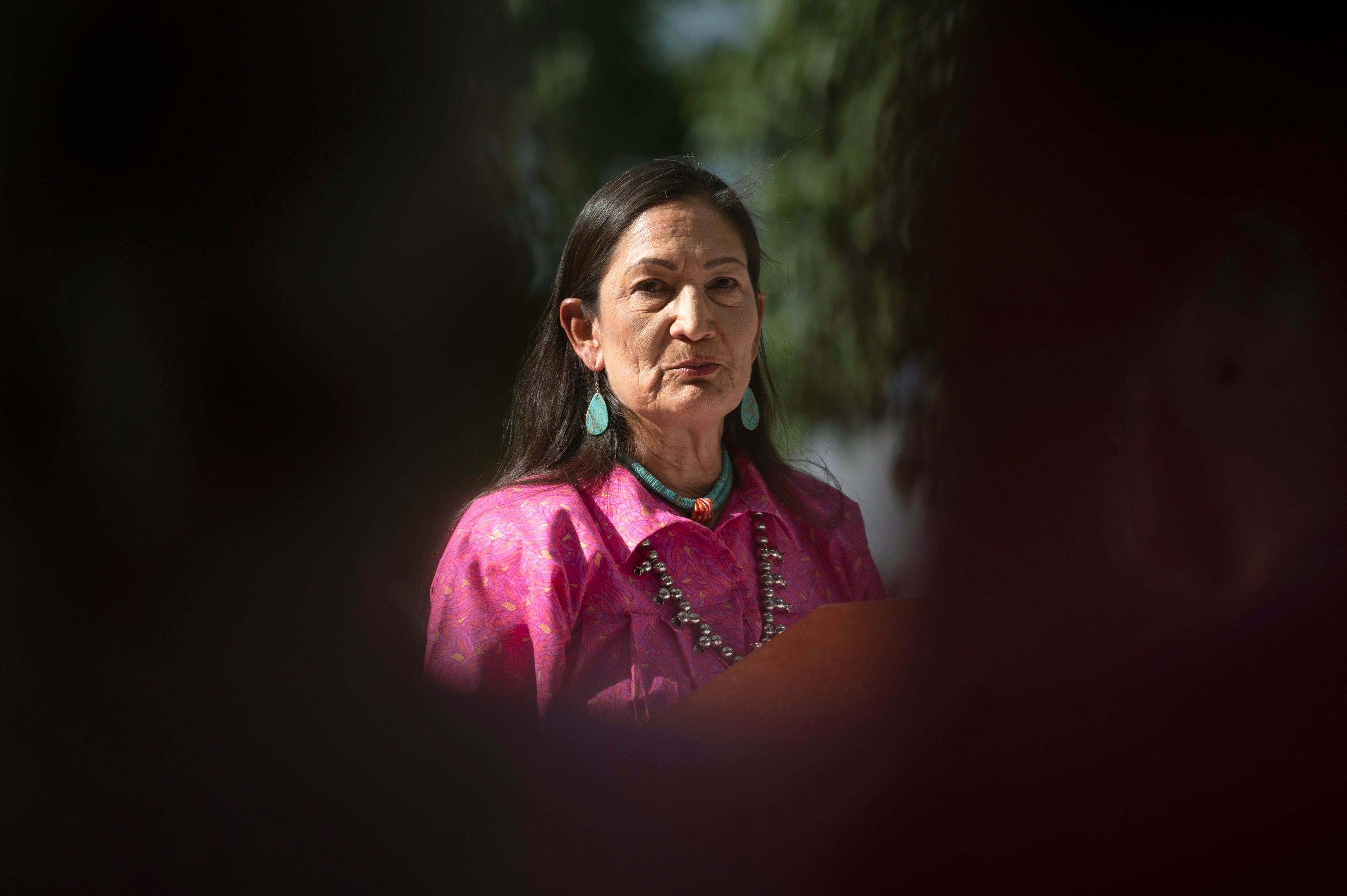
Hailed as a major victory for Native Americans and their families, the US Supreme Court has left intact a federal law that sought to remedy the government’s past abuses and the legacy of forced removal of Indigenous children from their families.
In a 7-2 vote from the nation’s highest court, justices have upheld the Indian Child Welfare Act, preserving the law’s preference to the foster care and adoption of Native children by their relatives and Tribes.
The landmark law, in place for nearly 50 years, followed a congressional investigation that found that more than one-third of Native children were removed from their Tribal homes and placed with non-Native families and institutions, severing their ties to the families and Tribes.
US Interior Secretary Deb Haaland – among the first Native American women to serve in Congress and the first Native American to serve as a secretary in a presidential cabinet – said the court’s decision on 15 June “is a welcome affirmation across Indian Country of what presidents and congressional majorities on both sides of the aisle have recognized for the past four decades.”
“For nearly two centuries, federal policies promoted the forced removal of Indian children from their families and communities through boarding schools, foster care, and adoption,” she said in a statement. “Those policies were a targeted attack on the existence of Tribes, and they inflicted trauma on children, families and communities that people continue to feel today.”
Passage of the landmark law in 1978 “put an end to those policies,” she said, and ensured that the US would “meet its legal and moral obligation to protect Indian children and families, and safeguard the future of Indian Tribes.”
A ruling in Brackeen v Haaland, written by conservative Justice Amy Coney Barrett, who was appointed by Donald Trump, affirms that congressional authority “to legislate with respect to Indians is well established and broad.”
Conservative Justices Clarence Thomas and Samuel Alito dissented.
The ruling followed a challenge from Chad and Jennifer Brackeen, alongside other non-Native prospective adoptive couples and three states, who argued that the law violated state sovereignty and their constitutional rights by discriminating against them on the basis of race.
The court rejected that argument on its merits and for lack of standing, with a ruling that underscored the preservation of critical cultural and familial ties among Native American children. Tribal authorities and their supporters have argued that the Indian Child Welfare Act is based on political distinctions, not racial ones, and that Congress drafted the law to ensure Tribal futures.
A concurring opinion from conservative Justice Neil Gorsuch wrote in ardent support.
“Our Constitution reserves for the Tribes a place – an enduring place – in the structure of American life. It promises them sovereignty for as long as they wish to keep it. And it secures that promise by divesting States of authority over Indian affairs and by giving the federal government certain significant (but limited and enumerated) powers aimed at building a lasting peace,” he wrote.
“Congress exercised that lawful authority to secure the right of Indian parents to raise their families as they please; the right of Indian children to grow in their culture; and the right of Indian communities to resist fading into the twilight of history,” he added. “All of that is in keeping with the Constitution’s original design.”
President Joe Biden said in a statement celebrating the court’s decision that the Indian Child Welfare Act sought to “protect the future of Tribal Nations and promote the best interests of Native children, and it does just that.”
“The touchstone law respects tribal sovereignty and protects Native children by helping Native families stay together and, whenever possible, keeping children with their extended families or community who already know them, love them, and can help them understand who they are as Native people and citizens of their Tribal Nations,” he added.
His statement addressed the “painful history” looming over the decision, pointing to the legacies of boarding schools and forced removals of Native children from their communities, “all with the aim of erasing who they are as Native people and tribal citizens.”
“These were acts of unspeakable cruelty that affected generations of Native children and threatened the very survival of Tribal Nations,” he added. “The Indian Child Welfare Act was our Nation’s promise: never again.”

Tribal authorities across the country also have welcomed the decision.
Navajo Nation President Buu Nygren, representing the largest Tribe within the US, said the ruling is a victory for “all Indigenous children and all Indigenous Nations in the United States.”
“We hope this decision will lay to rest the political attacks aimed at diminishing tribal sovereignty and creating instability throughout Indian law that have persisted for too long,” according to a statement from leaders of the Cherokee Nation, Morongo Band of Mission Indians, Oneida Nation and Quinault Indian Nation.
More than a dozen states have incorporated federal protections in the Indian Child Welfare Act into their state codes; American Civil Liberties Union and other advocacy groups have urged other states to do the same.
“Tribes have a fundamental right to govern themselves and make decisions on issues that affect their own people – including Native children – without interference from federal or state governments,” said Crystal Pardue, a staff attorney with the ACLU’s Racial Justice Program. “Native families have a right to stay together, care for their children, and preserve tribal culture by ensuring access to their cultural identity, language, and heritage.”







